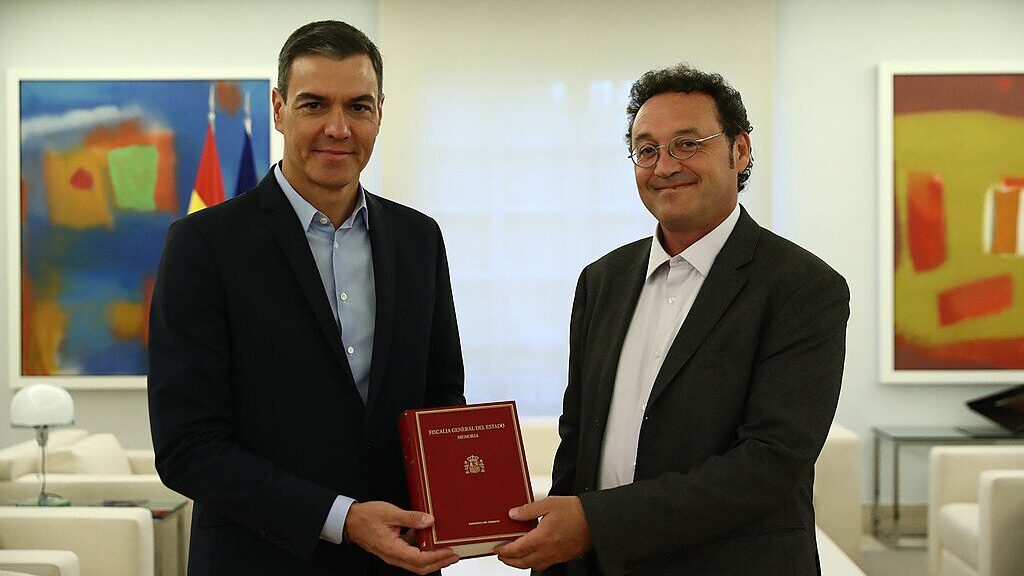
Álvaro García Ortiz delivers the Annual Report of the Attorney General’s Office of the year 2021 to Prime Minister Pedro Sánchez.
Photo: Ministry of the Presidency. Government of Spain, via Wikimedia Commons
The rule-of-law violations by Spanish Prime Minister Pedro Sánchez are becoming more evident everyday,
This week, they came in the form of two rulings against the current State Attorney General Álvaro García Ortiz, appointed by Sánchez in 2022.
On Tuesday, Spanish courts annulled or questioned two recent decisions that García Ortiz was responsible for. The Supreme Court annulled the appointment of Dolores Delgado as prosecuting attorney for the chamber of democratic memory and, just ten minutes later, a Madrid court announced it had opened a case against the state for revealing personal tax information about the partner of Isabel Díaz Ayuso, president of the Madrid regional government and a constant thorn in the side of Sánchez. Following that announcement, the Madrid Prosecutors Association called for García Ortiz to resign, as he had brought the credibility of his office to “the lowest of minimums.”
Returning to the Supreme Court decision, Spain’s highest court ruled Garciá Ortiz’s appointment of Delgado an “incontestable,” “visible and undeniable deviation of power.” Delgado herself has been a controversial figure in Sánchez’ government. A career state prosecutor, she was named minister of justice in Sánchez’ brief first government in 2018. He took her out of the position in 2020 and immediately proposed her as general prosecuting attorney, a controversial move due to her obvious political connection. She resigned from that post in 2022, and her replacement, Garcá Ortiz, immediately put her forward as prosecutor for the Chamber of Human Rights and Democratic Memory, a position created just for her, according to analysts —and one that is key in advancing Sánchez’ attempts to enforce a left-wing narrative of the Spanish Civil War and subsequent Franco regime.
But her appointment met opposition. The council of prosecutors, which is charged with evaluating and certifying specific aspects of the candidates including that they are free of foreseeable conflicts of interest , requested more time to be able to study Delgado’s situation as she is married to a well-known human rights lawyer and left-leaning political activist. Garciá Ortiz forced the issue and convened the council. The same seven members abstained from voting, considering the evaluation of Delgado a sham. Nevertheless, Delgado’s appointment was approved by a royal decree from the Sánchez executive. But three professional associations of prosecuting attorneys filed suit against the government, and as the lawyers had asserted, ruled the process and her appointment invalid, resulting in the nullification of the appointment. According to the ruling, her appointment was completely invalid, as the prosecutors’ group alleged, and the council of prosecutors will have to be reconvened for a proper vote, putting at risk her appointment.
The second ruling, from a Madrid court, also shows that García Ortiz exercises his office more—or at least as much—as a political tool than as one of impartial justice. The case surrounds an investigation into serious tax fraud, that could possibly involve others, against Alberto Gónzalez, the partner of Isabel Díaz Ayuso, a center-right politician with the Partido Popular. She is one of Spain’s most popular politicians and one of Sánchez’ finest critics, first coming into conflict with him over management of the COVID pandemic. Her reelection in 2021 was largely seen as a referendum by Madrileños against Sánchez. But instead of investigators quietly looking into her boyfriend’s past tax payments, as is usually done, information on the case was given to the press, a move not only highly unusual but one that possibly involved illegally divulging personal information about Gónzalez. Garcia Ortiz said he personally stood by the press note released by the tax department, but the court ruled in Gónzalez favor, showing itself suspicious of the government’s move. Indeed, Sánchez’s party and his government has not ceased to use the alleged tax fraud to call for Ayuso’s resignation and accuse her party of corruption, a defense it has used in every parliamentary debate on the socialist own corruption case.
The situation shows that Spain’s courts have retained a good degree of independence despite Sánchez’ constant attempts to control them. But Sánchez doesn’t seem to back down ever, though hopefully at least for now, he will be rerouted.
